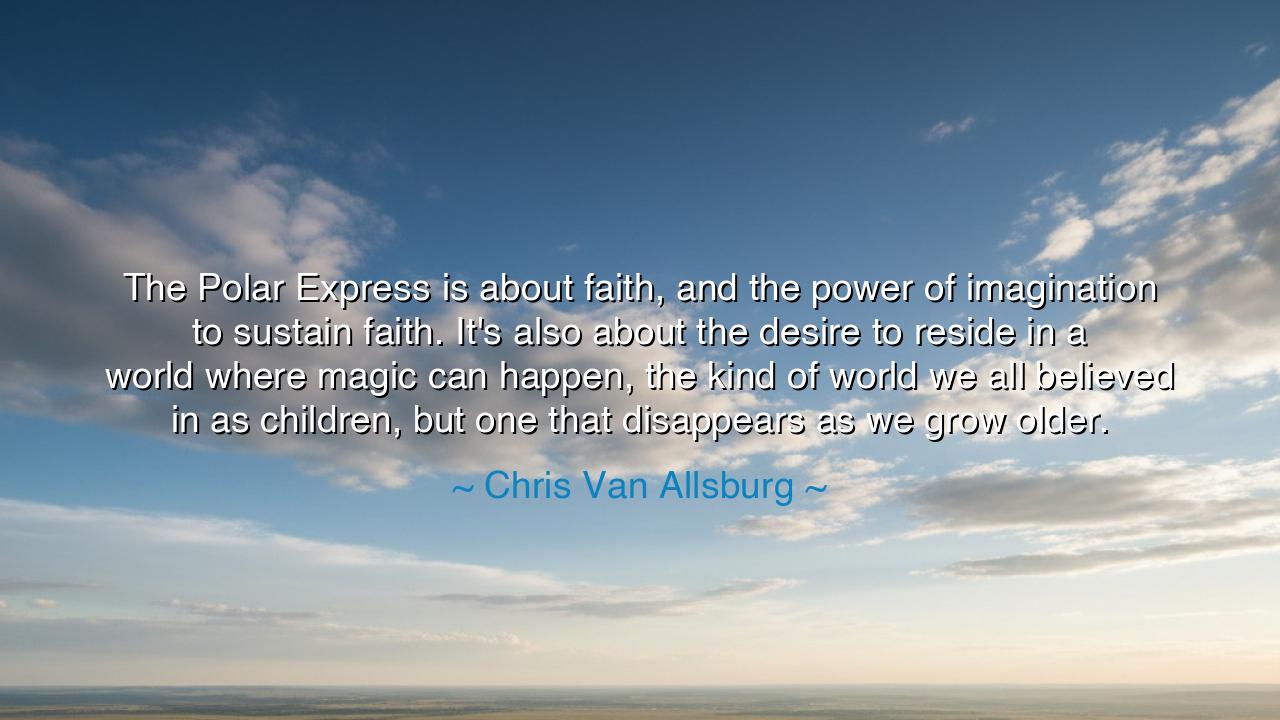
The Polar Express is about faith, and the power of imagination to
The Polar Express is about faith, and the power of imagination to sustain faith. It's also about the desire to reside in a world where magic can happen, the kind of world we all believed in as children, but one that disappears as we grow older.






The words of Chris Van Allsburg, creator of The Polar Express, resound like a gentle bell echoing through the snow: “The Polar Express is about faith, and the power of imagination to sustain faith. It's also about the desire to reside in a world where magic can happen, the kind of world we all believed in as children, but one that disappears as we grow older.” In these lines lies a truth older than any train or tale — the truth that faith and imagination are not separate virtues, but twin lights that guide the soul through the fog of life. The story of the Polar Express, though wrapped in the innocence of childhood, carries a wisdom as ancient as the stars — that to believe is the first act of creation, and to imagine is to keep the divine alive within us.
In the ancient world, before machines and iron, men and women spoke of the unseen as easily as they spoke of the sky. The hearth fire was sacred, the forest alive, the sea divine. They lived in a world of magic, not because their eyes deceived them, but because their hearts had not yet hardened to wonder. Van Allsburg’s words remind us that we too once saw the world in this way — when the rustle of leaves was a whisper from the unseen, when snowflakes carried secret messages, and when a simple bell could sing of eternity. But as the years pass and the burdens of reason press upon us, that world fades. We trade our faith for facts, our imagination for certainty, and in doing so, we silence the song that once made the world glow.
The origin of Van Allsburg’s insight lies in the heart of every soul that has grown up. He speaks of the ache of nostalgia — that quiet grief for the lost kingdom of childhood, where magic was not questioned but assumed. It is not the world that changes as we age, but our vision of it. The faith of the child is not blind; it is pure, untarnished by cynicism. The child believes because belief itself is natural. But the adult, scarred by disappointment, learns to doubt, and in doubting, closes the door through which imagination once entered freely. Thus, the Polar Express becomes a parable: the train is the journey back to faith — not to ignorance, but to rediscovery.
Consider the story of Helen Keller, a woman who lived in darkness and silence, cut off from sight and sound. By all worldly measure, her life should have been void of wonder. Yet through the hand of her teacher, she awakened not only to knowledge but to faith — in herself, in others, in the unseen beauty of the world. She once wrote, “The best and most beautiful things in the world cannot be seen or even touched — they must be felt with the heart.” This is the same faith Van Allsburg speaks of: the imagination that transcends the limits of flesh, that sustains the spirit when the eyes can no longer see. It is the same magic that children know instinctively — that believing makes the unseen real.
When Van Allsburg says that this world “disappears as we grow older,” he does not mean that it is destroyed. Rather, it is buried — beneath layers of duty, weariness, and fear. Yet it can be uncovered again, if we dare. The Polar Express is not a train of steel and smoke; it is the chariot of the soul, waiting for those who still listen for the bell that only rings for believers. The man who has lost wonder is poor indeed, no matter how much he owns. But the one who can still imagine, who can still believe that magic can happen, carries the wealth of eternity in his heart.
So, my child, take this teaching as you would take the gift of a bell on a cold winter night: fragile, beautiful, and real only when you believe. Do not let the noise of the world drown out the faith that lives in silence. Nurture your imagination as the ancients nurtured the flame that guarded their homes. Read stories not merely for pleasure, but for remembrance — to recall that within every tale of wonder lies a deeper truth about who we are. Speak of miracles not with skepticism, but with the humility of one who knows that the greatest mysteries are unseen.
Let this then be your guiding wisdom: the power of imagination is not to escape reality, but to illuminate it. To have faith is to see the invisible, to believe that love, goodness, and beauty are not fables, but living forces woven into the fabric of existence. Walk, then, through your life as if through falling snow — seeing not the cold, but the light that gleams upon it. And when you hear the faint ringing of that hidden bell — the one that calls to every heart that still dares to dream — do not doubt. For it is the voice of the eternal child within you, calling you back to the world where magic still lives.






AAdministratorAdministrator
Welcome, honored guests. Please leave a comment, we will respond soon